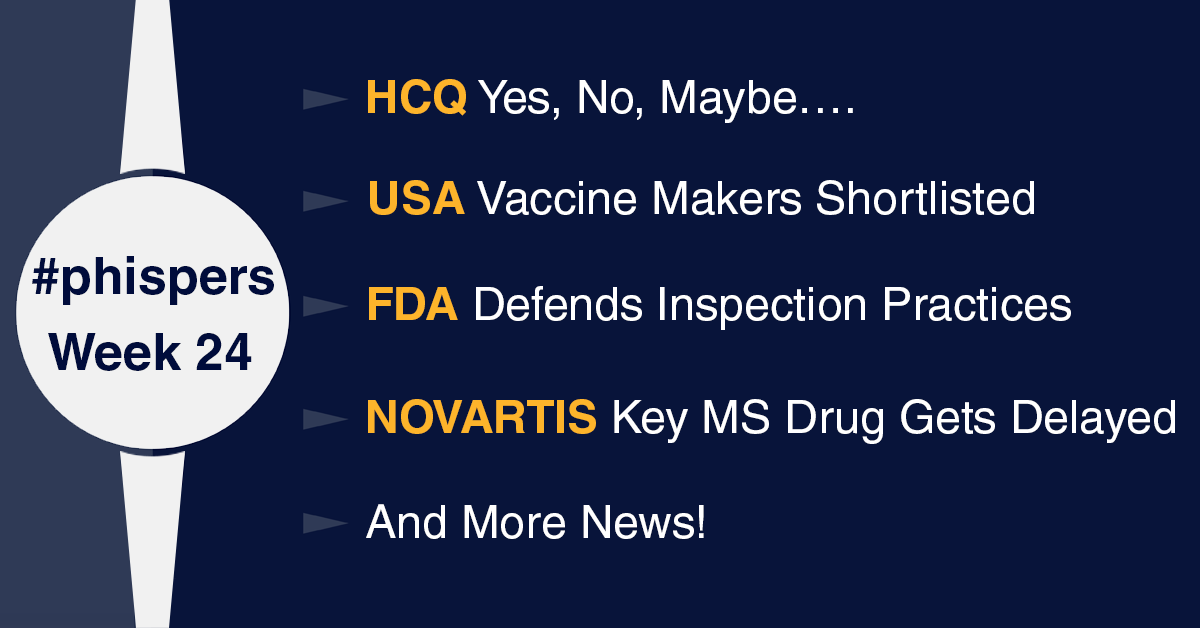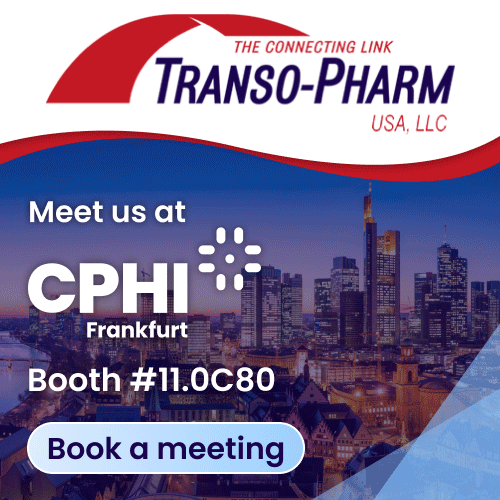
By PharmaCompass
2020-06-11
Impressions: 82997
This week, Phispers has more news on hydroxychloroquine (HCQ) as a treatment for Covid-19.
While a large, randomized study in the UK termed it as “useless”, medical journal The Lancet retracted an influential study, which in turn, led to the retraction of another study on the drug as a cure for Covid.
As a result of the retractions, the WHO said it will resume its trials of HCQ against coronavirus, as part of its ‘Solidarity’ trials.
The USFDA defended its inspection practices in foreign facilities before a Senate committee hearing last week.
The US shortlisted five manufacturers in the race to make the Covid-19 vaccine — Moderna, J&J, AstraZeneca-Oxford, Pfizer and Merck — under its Operation Warp Speed that seeks to make millions of doses of the vaccine by the end of this year.
Lonza, the company that is preparing to build manufacturing facilities to make ingredients for Moderna Inc’s experimental Covid-19 vaccine, has poached its new CEO from Roche.
In the UK, a director of a drug company — Auden McKenzie — was banned from holding director positions at any UK company due to a price fixing case.
And Novartis’ key multiple sclerosis drug was delayed as FDA extended its review period.
Does HCQ show benefit in Covid-19 patients? Yes, no, maybe…
Last week saw more flip-flops on the anti-malarial drug hydroxychloroquine (HCQ), which has been touted as a “game-changer” by the US President Donald Trump. First, there was news that a major clinical trial — called RECOVERY — showed that HCQ had no benefit for patients hospitalized with Covid-19.
RECOVERY, a randomized, large patient trial, is funded by the UK government and involves the country’s National Health Service (NHS). It looks at various potential treatments for Covid-19, and the goal was to rapidly get answers as to what works and what doesn’t.
“This is not a treatment for Covid-19. It doesn’t work,” Martin Landray, an Oxford University professor who is co-leading the RECOVERY trial, said, adding that the drug is useless. As a result, the British scientists have halted the study.
A total of 1,542 patients received HCQ and 3,132 received usual care. After 28 days of treatment, 25.7 percent of those on HCQ and 23.5 percent of those who received usual care had died. This meant that those on HCQ were 11 percent more likely to die.
Second, the world’s leading medical journal The Lancet retracted an influential study that had raised safety concerns about the experimental Covid-19 treatments chloroquine (CQ) and HCQ amid scrutiny of the data underlying the paper.
Soon, the New England Journal of Medicine (NEJM) retracted another study that focused on blood pressure medications in Covid-19. The NEJM study had relied on primary data from the same company (known as Surgisphere).
The retractions came at the request of the authors of the studies. “We can no longer vouch for the veracity of the primary data sources,” Mandeep Mehra of Brigham and Women’s Hospital, Frank Ruschitzka of University Hospital Zurich, and Amit Patel of University of Utah said in a statement issued by The Lancet. “Due to this unfortunate development, the authors request that the paper be retracted,” the statement added.
Meanwhile, the University of Utah terminated the faculty appointment of Amit Patel, who was among the authors of the two retracted papers on Covid-19 and who appears to have played a key role in involving the little-known company for the primary data.
Third, the World Health Organization (WHO) said it will resume its trial of HCQ for potential use against the coronavirus, as part of its ‘Solidarity’ trials. It had briefly stopped giving HCQ to new patients in light of The Lancet paper.
Meanwhile, French drugmaker Sanofi also said it would review available information before deciding whether or not to enroll patients again for its Covid-19-related HCQ trials. On May 29, Sanofi had said it has stopped recruiting new Covid-19 patients for two clinical trials on HCQ until concerns about the safety of the drug were cleared up.
US shortlists vaccine makers under Operation Warp Speed; Inovio sues its CDMO
Last month, the Trump Administration had announced the launch of Operation Warp Speed to develop and manufacture millions of doses of Covid-19 vaccine by the end of this year. In order to meet that objective, the White House has selected five vaccine candidates they consider most likely to succeed.
The five candidates are from Moderna (whose vaccine candidate was the first to reach clinical trials), J&J (its candidate hasn’t gone into trials but has received around US$ 500 million in funding from BARDA), the AstraZeneca-Oxford venture (which won a US$ 1.2 billion grant from BARDA last month), Pfizer (which has been working with the mRNA biotechnology firm BioNTech) and Merck (it hopes to put its two vaccine candidates in clinical trials later this year).
Interestingly, French drugmaker Sanofi is missing from this list. Sanofi has worked with BARDA for long and had also received US$ 30 million in funding earlier this year for its recombinant DNA Covid-19 vaccine effort. Last month, Sanofi’s CEO Paul Hudson had said the US would get the “right to the largest pre-order” of their vaccine because the federal government had backed the project at-risk. This comment had angered the French government. Later, Hudson had said it was vital that any coronavirus vaccine reaches all parts of the world.
The list also omits promising candidates from NovaVax and Inovio. Though a formal announcement on the matter is expected later this month.
Inovio files lawsuit against contract manufacturer: As the race to be first off the block with a Covid-19 vaccine heats up, Inovio Pharmaceuticals has filed a lawsuit against Korean firm VGXI, its long-standing contract manufacturer.
In the lawsuit, Inovio claims that VGXI has said it can’t make the vaccine in commercial quantity and has refused to transfer the technology required to others who can manufacture it. VGXI is contractually bound to transfer technology knowhow to other contract manufacturers if it declines to make a vaccine for Inovio. The company also said it is being held “hostage” by VGXI, as it is refusing to provide crucial data needed to scale up vaccine production.
GAVI alliance raises half a billion for Covid vaccine: The GAVI, a public–private global health partnership to increase access to immunization in poor countries, has raised US$ 567 million from international donors for an Advanced Market Commitment to buy future Covid-19 vaccines for poor countries. Its initial goal was to raise US$ 2 billion.
Once the vaccine is developed, the deal would help secure enough doses of the vaccine for poor countries in order to immunize their healthcare workers and those at high risk and create a “buffer of doses” for use when needed.
The GAVI vaccines alliance also said it had raised US$ 8.8 billion from international donor governments, companies and philanthropic foundations to fund its immunization programs until 2025.
FDA defends its inspection practices in foreign facilities before Senate
The US Food and Drug Administration (FDA) defended its practice of giving advance notice to foreign facilities during a Senate Committee on Finance hearing last week. A new report from the Government Accountability Office (GAO) had criticized its oversight of foreign drug manufacturers.
In March, the FDA had halted most foreign inspections due to the ongoing Covid-19 pandemic.
During the hearing, the senators raised concerns that most manufacturing sites for finished drugs and active pharmaceutical ingredients (API) are located outside the US, along with concerns on the security of the US drug supply chain.
In response, Doug Throckmorton, deputy director for regulatory programs at FDA’s Center for Drug Evaluation and Research (CDER), said the agency is looking for ways to leverage advanced manufacturing to both improve drug quality and promote the onshoring of drug manufacturing.
Throckmorton also acknowledged that FDA lacks some of the information to have a thorough understanding of the earlier stages of the drug supply chain, such as the sources of chemicals used to produce API.
In response to criticisms over FDA’s practice of notifying foreign facilities in advance of inspections, Judith McMeekin, associate commissioner for regulatory affairs at FDA’s Office of Regulatory Affairs (ORA), said giving an advance notice of inspections helps avoid potential refusals by the companies overseas and also conserves the agency’s resources. McMeekin also clarified that FDA does conduct some unannounced inspections in other countries, but they are typically for-cause inspections.
Lonza poaches its CEO from Roche as it builds facilities for Moderna’s vaccine trials
Lonza, the company that is preparing to build manufacturing facilities to make ingredients for Moderna Inc’s experimental Covid-19 vaccine, has found a new CEO.
The chairman of Lonza, Albert Baehny, wanted a CEO with a good track record, who had worked for the Big Pharma or a biotech. Eventually, he found what he was looking for in Pierre-Alain Ruffieux, who is currently the head of global pharma technical operations at Roche.
Ruffieux, 50, has been with Roche for the last five years. He has more than 20 years of experience in the biopharmaceuticals industry. Prior to that, he worked for Novartis. Ruffieux takes the place of Marc Funk, who was promoted as the CEO of Lonza in early 2019 but exited the company quite suddenly in November.
Lonza, a Swiss contract drug manufacturer, has invested heavily in new cell and gene therapy capacity. In a statement, Lonza said Ruffieux will join on November 1. He will start his new job around the same time that Lonza aims at finishing one of its commercial production lines for the Moderna project.
Another Amit Patel gets named in UK price fixing case
While there was one Amit Patel whose faculty appointment to the University of Utah got terminated due to the retraction of two papers on Covid-19, there was another Amit Patel who had to sign undertakings that ban him from holding a director role at any UK company for the next five years. This Amit Patel was banned due to a price-fixing scandal.
Patel was a director at the pharmaceutical company Auden McKenzie from September 2014 to May 2015. A probe undertaken by UK’s Competition and Markets Authority (CMA) found that Auden McKenzie and King Pharmaceuticals Limited had tried to manipulate the supply and price of a widely used anti-depressant — nortriptyline. This is an NHS prescribed drug used to relieve symptoms of depression. The two companies had agreed that King would supply only 25 mg tablets and Auden Mckenzie only 10 mg tablets. They also agreed to fix the price and the quantities they would supply to the wholesaler.
The objective of the two companies was to limit competition. This implied that the NHS and the taxpayer in Britain would have to pay higher prices since the competition was restricted by virtue of this agreement.
Patel has played a similar role in his current position at Amilco, where he is the sole director. He has held this directorship since 2013. Patel admitted that from March 1, 2016 to October 19, 2016, Amilco and Tiofarma (another drug company) stayed out of the fludrocortisone market in the UK, thereby enabling the market-leader Aspen to maintain its position as the sole supplier for the country.
Novartis’ key multiple sclerosis drug gets delayed as FDA extends review period
In February, Novartis had announced that the application for its much-touted multiple sclerosis drug ofatumumab had been accepted and a decision on the drug by the US Food and Drug Administration (FDA) was expected in June. Ofatumumab, also known as Arzerra, is approved as a leukemia treatment.
But this month, the Swiss drugmaker announced that the FDA has extended the review period for ofatumumab by three months. Now, the agency is expected to take a decision in September, the company said while not disclosing the reason for the delay. Novartis had filed the application in December 2019.
Novartis has been eyeing the multiple sclerosis market to take on Biogen’s Tecfidera and Roche’s Ocrevus. Its CEO Vas Narasimhan has counted ofatumumab as one in the company’s list of potential blockbusters.
While the FDA has said their Covid-19 responsibilities had the potential to push back review timelines, so far the agency has moved on with its decisions at the usual pace.
The PharmaCompass Newsletter – Sign Up, Stay Ahead
Feedback, help us to improve. Click here
Image Credit : #Phisper Infographic by SCORR MARKETING & PharmaCompass is licensed under CC BY 2.0
“ The article is based on the information available in public and which the author believes to be true. The author is not disseminating any information, which the author believes or knows, is confidential or in conflict with the privacy of any person. The views expressed or information supplied through this article is mere opinion and observation of the author. The author does not intend to defame, insult or, cause loss or damage to anyone, in any manner, through this article.”








